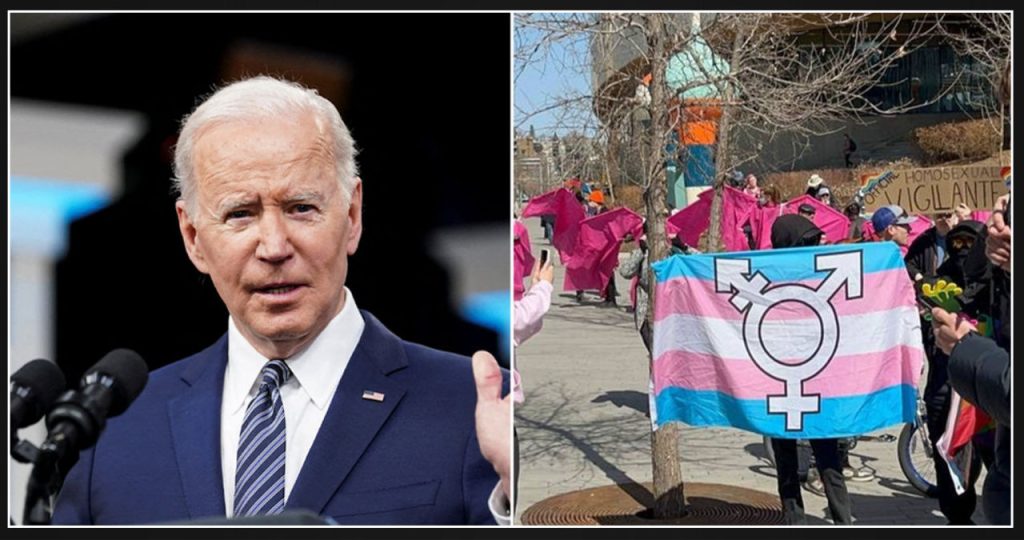This week, a federal appeals court delivered a ruling against Texas doctors who had attempted to sue President Biden’s administration over its transgender policies.
In a unanimous decision, the three judges from the 5th Circuit Court of Appeals did not rule on the merits of the case. Instead, they found that the doctors did not have standing to sue. The court’s decision, announced on Monday, emphasized that the doctors had not violated the policy and were not under any threat of enforcement.
The Biden administration’s policy aims to prevent discrimination against transgender individuals in the healthcare sector. However, Monday’s ruling has overturned a previous decision in favor of the doctors, which was issued by U.S. District Judge Matthew Kacsmaryk.
Biden’s Health and Human Services Department made a rule change in 2021, opting to interpret a section of the Affordable Care Act that prohibited discrimination based on sex to also include transgender individuals. However, three doctors from Texas contested this interpretation, claiming that it exceeds the scope of the law.
Supreme Court’s Historic Hearing Can Be a Massive Step in Preventing Trans Athletes from Participating in Girls’ Sports
The Supreme Court has the opportunity to make a groundbreaking decision that could have a significant impact on the participation of transgender athletes in girls’ sports. This historic hearing has the potential to address the concerns raised by many who argue that allowing transgender girls to compete in girls’ sports could lead to unfair advantages and potentially undermine the integrity of women’s sports.
The issue at hand is whether transgender girls should be allowed to participate in girls’ sports based on their gender identity. While some argue that inclusion and equality should be prioritized, others raise concerns about the potential physical advantages that transgender girls may have over cisgender girls due to differences in biology, such as muscle mass and testosterone levels.
If the Supreme Court decides to take action in preventing transgender athletes from participating in girls’ sports, it could set a precedent that would have far-reaching implications. This decision would not only impact high school and college sports but also have implications for professional sports and international competitions.
It is important to note that the Supreme Court’s decision would not be based on personal opinions or biases, but rather on the interpretation of existing laws and the Constitution. The court will have to carefully consider the legal and ethical implications of their decision, weighing the rights of transgender individuals against the potential impact on the fairness and integrity of women’s sports.
This historic hearing has sparked intense debates and discussions across the country. Supporters of transgender rights argue that transgender girls should be allowed to compete in girls’ sports without any restrictions, as long as they meet the guidelines and regulations set by the governing bodies of each sport. On the other hand, opponents argue that allowing transgender girls to compete in girls’ sports could lead to an unfair advantage and potentially discourage cisgender girls from participating.
Regardless of the outcome, this case highlights the importance of finding a balance between inclusivity and fairness in sports. It is crucial to provide opportunities for transgender athletes while also ensuring a level playing field for all participants. The Supreme Court’s decision will undoubtedly shape the future of transgender inclusion in sports and could have a lasting impact on the landscape of women’s athletics.
Doctors in Texas are looking to challenge President Biden’s transgender policies.
The doctors further emphasized that the policy may compel them to provide treatments that go against their personal beliefs. They gave examples such as the case of a transgender woman with prostate cancer, where the treatment would need to align with the individual’s biological sex.
Just a few weeks ago, the Supreme Court was deliberating on a case regarding transgender policy. The case questioned whether state bans on transgender surgeries for minors were constitutional. Now, in a significant ruling, the Supreme Court has delivered its decision on the matter.
Trump’s pick for Attorney General has a strong track record of building consensus.
During the oral arguments, the conservative justices of the Supreme Court expressed hesitance towards overturning the Tennessee law at hand. Chief Justice Roberts and Justice Brett Kavanaugh emphasized the role of state legislatures in regulating medical procedures, suggesting that they are better suited for such decisions. Roberts pointed out that the Constitution delegates these matters to the people’s representatives, rather than the nine justices on the Supreme Court, none of whom possess medical expertise.
A rally outside of the U.S. Supreme Court sees the participation of a transgender rights supporter. (Getty Images)
Justice Samuel Alito, on the other hand, pointed out the existence of “overwhelming evidence” from specific medical studies that highlight the adverse effects experienced by adolescents who have undergone gender transition treatments. If the justices decide to support the lower court’s ruling based on their party affiliations, it will have significant implications for over 20 states in the United States that have taken steps to enforce similar legislation.
The Biden administration and the ACLU represented the petitioners in this case. They filed a lawsuit on behalf of the parents of three transgender adolescents and a doctor based in Memphis, seeking to overturn the Tennessee law.
During Wednesday’s oral arguments, the focus was on determining the level of scrutiny that courts should apply when evaluating the constitutionality of state bans on transgender medical treatment for minors like SB1. The key question was whether these laws can be considered discriminatory based on sex or against a “quasi-suspect class,” which would then require a higher level of scrutiny under the Equal Protection Clause of the Constitution.
Also Read:
- Authorities investigating shooting and vehicle fire resulting in man’s death outside SW Houston residence
- Harris County Sheriff’s Office conducts proactive operation, confiscating weapons, drugs, and cash
